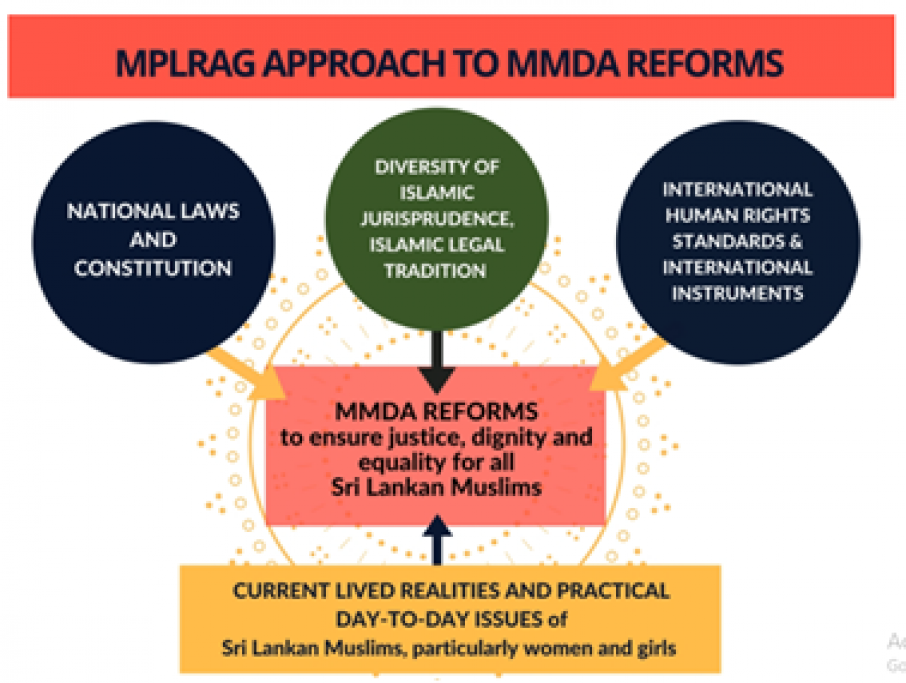Best Practices on Feminist Leadership - Muslim Personal Law Reform Action Group (MPLRAG)

General Context
Muslim Personal Law Reform Action Group (MPLRAG) is a group of Muslim women who are primarily rights advocates, lawyers, researchers and writers. They are collectively driven by their personal experiences, their accountability to those whose stories they represent, and their commitment to a positive Muslim family law framework in Sri Lanka. The work of MPLRAG members is on a fully voluntary basis. MPLRAG major motivation is reform of discriminatory laws and practices that applies to every Muslim whom they regard as their very own in Sri Lanka. It is their conviction that all Muslims in Sri Lanka, women and men, should have equal access to legal rights, justice and redress on matters of marriage and family.
MPLRAG follows various approach to their work to ensure justice, dignity and equality for all Srilankan Muslims, such as recognition of the diverse roles of the Srilankan Muslim women. They strongly believe that the action framework which they follow are women centric and situates the experiences of women within the broader context of gender and power. MPLRAG’s advocacy and lobby is based on in-depth and continual study of how the Muslim Marriage and Divorce Act (MMDA) currently applies to Sri Lankan Muslims, of the inherent discriminations and injustices in the text of the legal provisions and of the practical difficulties in the Quazi court system and structure. Their advocacy and activism activity challenges the social and political legal structure that oppresses women and they have been rigorously working to bring a reform in the current existing structure which demands women’s experiences of the law, its implementation procedure and their just expectations must inform and shape the reform agenda. While the substantive law must ensure equality and justice for all, procedural law must be sensitive to needs of all members of the community including women.
Advocacy Agenda Setting
Agenda
MPLRAG, initially came together on bringing about reform to Muslim personal law, marriage and they had a very specific objective that “The MMDA must be reformed to guarantee justice and fairness as promoted by the spirit of Islam, to address ongoing grievances of Muslims and in relation to contemporary and diverse contexts of Sri Lankan Muslims”. The MMDA was a well-recognized issue and group of determined volunteers willing to bring a transformation in the MMDA laid out a set of demands which was the agenda setting moment for them. MPLRAG believed that the demands were more than what any other Muslim group had been asking for. The document was a collective voice of all. The demands covered the issue of age of marriage, women in Quazi court positions, regarding MMDA application, capacity to enter the marriage, dowry, polygamy, and provisions related to divorce, due to which MPLRAG action was considered as the radical voice. Hyshyama said that acknowledgement of the document by the government itself and being called to the committee to
|
“It's about lived realities, if you're not serving lived realities, consensus makes very little sense. And I think that has been our main role, sort of like either anticipating or responding to the kind of conversations that attempt to detract from it being a conversation about women's rights and realities” |
represent the community and push the agenda further has been one of the major achievement and a step towards transformation.
MPLRAG’s action created a space for other groups for the reform. MPLRAG took a very complex issue and simplified them for public consumption due to which it made a huge impact over the young muslim women women, and non-muslim women because a wave of awareness was created and allies were created. Speaking of the engagement of diverse women group, space for non-binary gender identity has not been recognized by the law in general in Srilanka due to which their engagement in the agenda has not been seen.
Participation and Representation
In terms of agenda setting, there is no formal structure in MPLRAG, initially the demands were set by the core team and during the process the voice of the marginalized, underprivileged, the lived realities were brought up in the conversation were taken into account through consultation and collaborative approach with every groups. The participation of the stakeholders pre-pandemic had always been active and physical however post pandemic the participation has been mostly online. The response to indication has always been positive due to the sense of solidarity among all. The policy makers and decision makers are also involved in the meetings. The participation of all the stakeholders are ensured by MPLRAG through constant communication and the venue for the meetings and consultation workshop are always considered and accessible to all. Mutual leadership has been observed, the networks have played a very supportive role. Many community groups take initiatives to set agendas and carry out campaigns as MPLRAG have provided a space for all. MPLRAG has taken a leadership to respond to the state to preempt certain things, democratizing the information and keeping the networks well informed.
In terms of transformation of power relation among the diverse groups, there have been power sharing and power within among the groups. In terms of raising the issue nationally and media engagement due to the geographical setting the one who have access at center level are engaged and the ones working at the community level provide their support to the networks in the center by informing them about the issue at ground level and carrying out advocacy activities taking all the groups further and leaving no one behind,
Strategies for mobilizing and collectivizing
Strategies
Various strategies have been attained by MPLRAG in collaboration with their networks to address the muslim women issues. Some of the strategies have been demonstrated in the figure below:
The strategies acquired have been supported and reinforced by the work of many ground level activists and community based organizations. The organizations, activists working in common issues, shared understanding and similar experiences ere crucial aspects in building solidarity and cause to fight for justice. Likewise through various publications, case study, demand document, reports, position paper, stories about lived realities and online campaigns have contributed in creating awareness about the gendered issues affecting the community and dismiss myths about Islamic law. MPLRAG with their networks have meticulously been working on strengthening the existing quazi court system. Various women organizations linked with MPLRAG have undertaken legal literacy programs, capacitating and mobilizing community women to provide legal advice on the MMDA which has built a level of confidence in the muslim women. The advocacy and activism towards reforming the MMDA has primarily been led by muslim women however alliance with non-muslim women and men has been seen effective only while they made an attempt to engage and understand the issue. The strategies adopted have always been non-violent and peaceful.
Role of Different actors
Several new networks are formed from time to time. The community activists, various network at the central region, community based organizations and MPLRAG have their own role to play in furthering the agenda(MMDA reform). The organizations at the center are responsible for communicating with the policy makers and communicate the networks at community and keep them well informed about the progress and ongoing situation. Likewise the community based networks are responsible for strengthening the relation at community level and sharing the issues of the ground level. Collaborative approach and solidarity has seen to be very effective in bringing transformation to some extent. Involvement of every actors have contributed
Gender Roles
The issue of MMDA is a common issue realized by all and the women engagement with MPLRAG in the MMDA reform have seen to be remarkable. Awareness can be observed through increase of participation in activism. However it was found out that the perception men regarding the women’s engagement in the advocacy is not taken positively. The strategies used to encourage the participation of women in the advocacy have brought some changes in the conditions of women in the society and have been helpful in improving the mobility of the women in their community.
Leadership
The women involved in the advocacy can be seen taking initiatives to shed light to the issue and spreading awareness. The women group have stood up for equitable governance structure of networks that fosters fair and equal treatment however in regards to the inclusiveness of the gender minorities , due to the conservative law their identity has not been recognized at all. The feminist organizations are committed in creating a space for women of every generation and have been determined to promote the voices of all.
Challenge Dominant Epistemology
Activists noted that the shared context of the issue faced by women have been seen crucial in building solidarity and a common cause for seeking justice and building a base for the future generation to help them stand for same and other agendas in the future.
Latest Comments
Upcoming Events
Editor's Pick
- Emergence and Practice of Feminist Knowledge in Nepal General
- Walls Turned Sideways Are Bridges Reports
- No Justice without Reparation: Why Rape Survivors Must Have a Right to Compensation General
- Child Marriage Prosecutions in India - Case Law Analysis of Actors, Motives and Outcomes 2008-2017 General
- Feminist Leadership best practices - Sangat Best Practices




Good content.